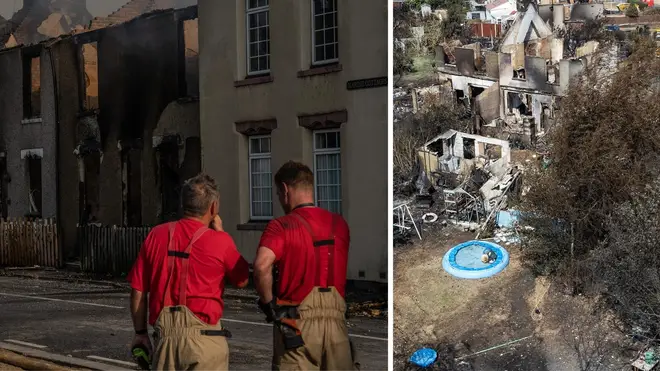
Richard Spurr 1am - 4am
20 July 2022, 13:44 | Updated: 20 July 2022, 14:34

A London firefighter who battled the wildfire at Wennington yesterday has told LBC the Brigade were dangerously short staffed whilst dealing with the heatwave’s 'apocalyptic' conditions.
London Fire Brigade had to declare a major incident as it fought at least 10 blazes across the capital, but LBC has been told a long-standing staffing crisis meant around a quarter of their fire engines were out of action.
George (not his real name) says it took his team around half an hour to get out to Wennington, because all closer crews were busy.
He described the scenes as “apocalyptic”.
Read more: 'Our house isn't there any more' Son's failed battle to save burning home with a hosepipe
Read more: Tears and devastation as scores of homes destroyed in heatwave as UK braces for storms

Footage shows Wennington fire devastation amid UK heatwave
“Before we knew it we were chasing it down the road, with the fire going into people’s houses, into stables, their gardens.
“It felt apocalyptic, just crazy, we were chasing it and we had no chance of stopping it.“
He says the service has been suffering from poor staffing levels since last year, and that yesterday the crisis culminated in 39 fire engines being ‘out of action’ - because there weren’t the crews available to run them.
“That’s about a quarter of all London’s fire engines. And that’s not an unusual thing - it’s happening quite a lot.
“The London Fire Brigade at the moment is completely understaffed - but nothing is happening to fix it.

Extent of damage done by fires in Dagenham seen after record-breaking heatwave
“We have been warning that something like this is going to happen for ages.
“We had 15 fire engines on that job in Wennignton yesterday - for a fire like that it would usually be at least double that.
“It was ridiculous.”
London Fire Brigade’s Union also put a warning out about the lack of available engines, saying “all our firefighters deserve better”
The union said in a statement: “We have previously highlighted the fact that we have been experiencing incredible staff shortages with multiple fire appliances unavailable since December last year.
“Yesterday was no exception with 39 fire engines unavailable for deployment due to simply not having enough firefighters.
“All of our firefighters deserve better.”
George is worried that as the climate crisis gets worse, the Brigade will continue to suffer enormous strain on days like Tuesday.
He said: "It was the worst of days. Putting on that fire gear on a normal summer's day is bad enough, you are sweating as soon as you put it on.
“But yesterday was just unreal. I think 6 firefighters collapsed in the end.
“Also, a lot of the firefighters who were there were also at Grenfell, and I think five years on - as firefighters we would have expected the fire brigade to be a lot stronger and better prepared - but it’s not, it’s worse.”
In a statement, Richard Mills, Deputy Assistant Commissioner at London Fire Brigade said: “Firefighters across London have worked tirelessly to tackle fires during unprecedented hot weather, on one of the busiest days in our history.
“Our firefighters worked in very difficult conditions to protect Londoners and their heroic actions mean that no lives were lost. I am immensely proud of them and their dedication in such unprecedented heat.
“We attended hundreds of incidents across the capital and overall our control room staff took more than 2,000 calls in response to fires which started in extremely dry and hot weather conditions.
“We declared a major incident and worked with emergency service partners who have also been working hard to continue to run services in these difficult and challenging conditions.
"By taking action, we were able to focus and prioritise our resources, recall staff from training, call on support from other local fire and rescue services and attend every incident as needed.”